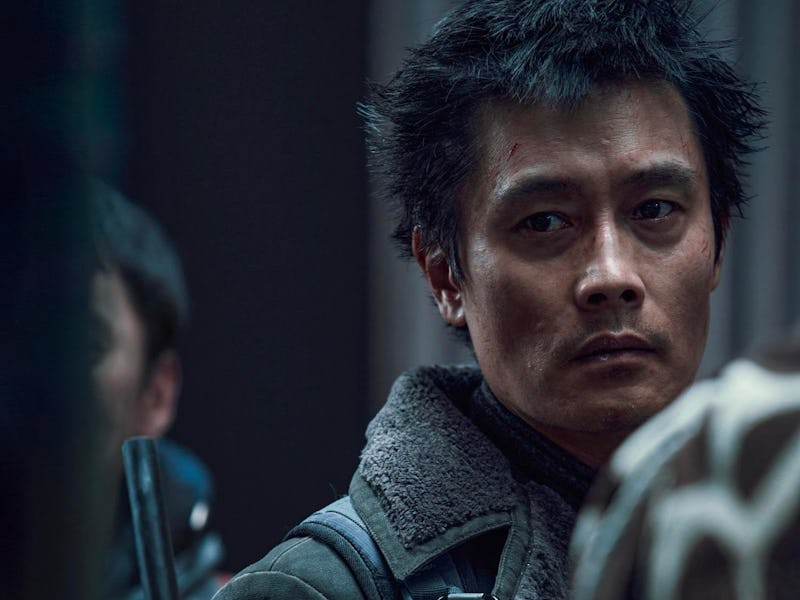Concrete Utopia Proves Disaster Thrillers Can Still Be Soulful
South Korea’s Oscars selection brings the class disparity of Parasite to the apocalypse.

“I feel like our apartment complex has been chosen,” boasts Kim Young-tak (Lee Byung-hun), a resident of Seoul’s Hwang Gung apartments and one of Concrete Utopia’s complex protagonists. His sense of pride isn’t uncommon, but he and his neighbors have a unique reason to feel so protective over their abode. After an earthquake ravages the South Korean capital, their building is the last one standing for miles. Everything else has been decimated by the disaster: shopping malls, hospitals, and homes are all buried under mountains of debris. So perhaps Hwang Gung has been chosen. Whether it be by a freak twist of fate or the ironic musings of a higher power is not a question many of the residents try to unpack. As long as Young-tak says it, most will believe it. He is, after all, the cult-like figure elected to guide Hwang Gung through this fresh apocalypse.
It’s through Young-tak that survivors hope to prevail — not just against the blindsiding winter, but against the displaced neighbors that have sought shelter with them (inciting some brutal scuffles for security in the process). Evicting the squatters is Yeong-tak’s first order of business. Food and supplies are running dangerously low, and as the days stretch on without any sign of rescue, the residents of Hwang Gung are forced to band together against the outsiders pushing their way in. The decision to oust the people they now call “cockroaches” will set off a violent chain of events — but their choices, however callous, allow Concrete Utopia to highlight South Korea’s mounting class disparities from a fresh perspective. Even in a world with no capital and even fewer resources, humanity will still cling to a hierarchy — and Concrete Utopia explores the erosion of both with an invariable sense of objectivity.
South Korean cinema has long been fascinated with socioeconomic disparity, and speculative sci-fi has become a fertile playing field for so many directors. Bong Joon-ho had Parasite. (And Okja. And Snowpiercer). Lee Chang-dong had Burning. And Um Tae-hwa has Concrete Utopia, an apocalyptic thriller that’s equal parts Animal Farm and The Impossible.
The push-and-pull between the haves and have-nots in this particular apocalypse is at times darkly funny, and at others deeply disturbing and moving. Like so many of his contemporaries, Um (with the help of co-writer Lee Shin-ji) deftly juggles satire with evocative humanism. Its disparate tones are embodied in each member of Concrete Utopia’s ensemble, the majority played to perfection by some of South Korea’s biggest heavyweights.
As Young-tak gradually rises through the ranks as Hwang Gung’s Delegate, Squid Game’s Lee Byung-hun gets the chance to showcase slippery charm and fierce devotion in equal measure. The Marvel’s Park Seo-joon is Min-sung, an occasionally-fainthearted civil servant, and Young-tak’s de facto right-hand man. We experience nearly every event of the film — from the cataclysm that decimates the region to Young-tak’s meteoric rise through the ranks — through Min-sung’s eyes. Park makes the perfect audience surrogate, especially as he’s swept up in Young-tak’s increasingly autocratic tactics, and eventually forced to confront his role in it.
Park Seo-joon and Park Bo-Young co-star as newlyweds on opposite sides of a class war in Concrete Utopia.
With Min-sung’s help, Young-tak establishes a “residents first” mentality that he hopes will get Hwang Gung through the winter. For a brief while, the community flourishes. But as dissent mounts within Hwang Gung and beyond its haphazard borders, Young-tak’s once-benevolent everyman façade begins to chip away, driving more empathetic residents — like Min-Sung’s wife Myung-hwa (Park Bo-Young), and the young Hye-won (Little Women’s Park Ji-hu), one resident’s all-seeing teen daughter — to investigate his true intentions.
Concrete Utopia invokes rats-in-a-barrel survival thrillers like Lord of the Flies where it needs it the most — but as the residents’ efforts to hold on to their way of life of turn increasingly barbaric, the film charts a path all its own. As with so many South Korean thrillers, it’s building inevitably toward an operatic, melodramatic climax — but Um’s fierce direction, paired with Cho Hyoung-rae’s striking cinematography, keeps the film from traipsing into fluff.
The moral of the story may be a predictable one, and the character archetypes familiar, but there’s something improbably unique about Concrete Utopia. It wears its heart on a satirical sleeve, allowing brutal violence to coexist alongside meditations on security and compassion. That the film was unanimously selected as South Korea’s entry to the 95th Academy Awards is no surprise. With brilliant performances and a balanced, harrowing story to propel it, Concrete Utopia isn’t just one of the best films of the year: it may be the best disaster thriller in years.